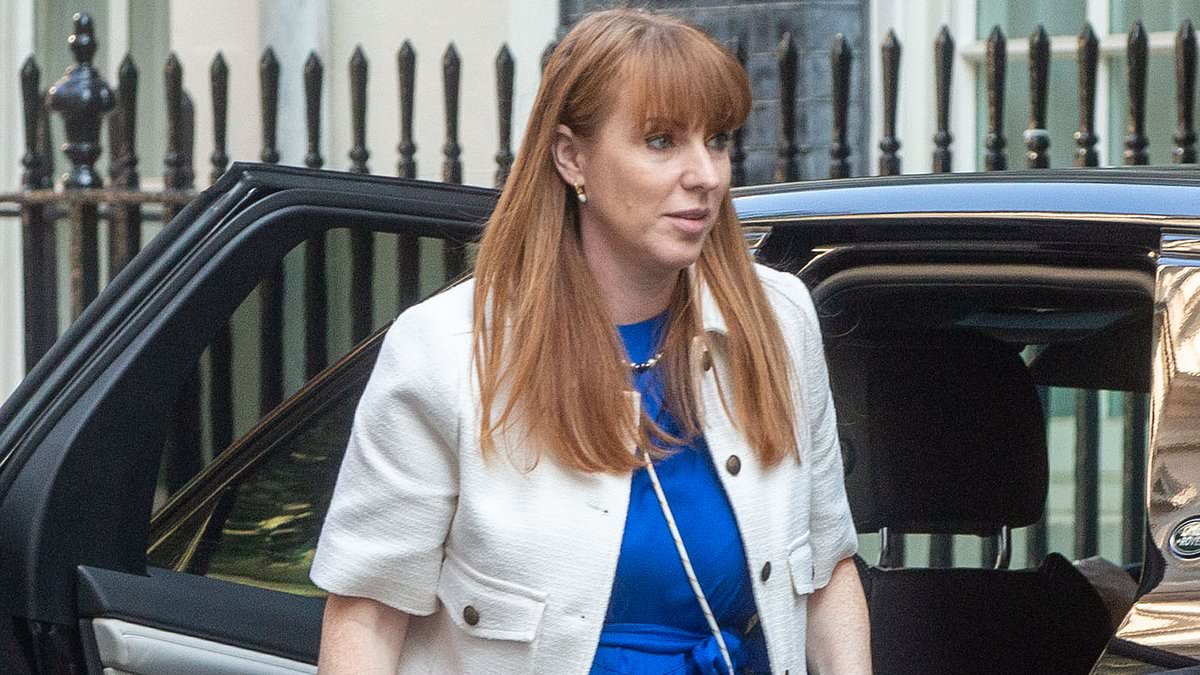Labour’s workers’ rights revolution will cost jobs and choke growth, ministers were warned last night.
Sir Keir Starmer said he wanted to ‘unlock growth and take the brakes off Britain’.
But the Prime Minister was warned that a radical package of employment rights championed by his deputy Angela Rayner could have the opposite effect.
Unveiled in Labour’s first legislative programme for 14 years, the new French-style laws will give employees a string of rights from their first day in the job, including the right to work from home, access to sick pay and protection from unfair dismissal.
Flexible working practices, such as ‘exploitative’ zero-hours contracts, will be banned and employers will be forced to pay a higher minimum wage to younger workers.
Ms Rayner’s plan – dubbed the Red Revolution – also rewards Labour’s union paymasters by scrapping a string of anti-strike laws and ‘removing unnecessary restrictions on trade union activity’.
New equality laws will also force firms to provide the Government with an annual audit of how much ethnic minority and disabled workers are paid.
Tory business spokesman Kevin Hollinrake said yesterday’s King’s Speech ‘made clear that Labour’s union paymasters come before the British public’.
He added: ‘This King’s Speech was nothing but a unions’ charter that will stifle investment, cut productivity, and burden small businesses.
‘These French-style regulations will damage our economy, which is showing signs of recovery.’
In a damning assessment, the Federation of Small Businesses said small firms were ‘increasingly worried about the developing employment rights package’.
Policy chairman Tina McKenzie said: ‘More than nine out of ten small employers say they are concerned about the prospect of increased costs and risks when they employ people, and there were no commitments within this to look after small employers who will struggle the most.’
The Prime Minister vowed to replace ‘snake oil populism’ with ‘determined, patient work and serious solutions’.
He said the new Employment Rights Bill would ‘level up workers’ rights, so every person has security, respect and dignity at work’.
But Rishi Sunak urged the new government not to impose ‘new burdens on businesses’ which could have ‘unintended consequences’.
‘They could lead to firms being less likely to invest and less likely to hire,’ he said.
Sir Martin Sorrell, chief executive of S4 Capital, said: ‘The devil will be in the details, but it will make employers more hesitant to hire.’ Pimlico Plumbers founder Charlie Mullins said Sir Keir had ‘opened the floodgates for disaster’.
But Unite union boss Sharon Graham welcomed the package, saying it was ‘key to rebalancing the relationship between employers and workers, making work fairer’.
Additional reporting: Martin Beckford and Leah Montebello
What Labour manifesto pledges were not included in the King’s Speech?
Despite containing a massive 40 new bills, the King’s Speech did not include some of Labour’s flagship manifesto pledges – the most glaring omission being the commitment to lower the voting age.
The party’s manifesto states: ‘We will increase the engagement of young people in our vibrant democracy, by giving 16 and 17-year-olds the right to vote in all elections.’
But there is no legislation in the first parliamentary session to introduce the major reform, although the King did say: ‘My ministers will strengthen the integrity of elections and encourage wide participation in the democratic process.’
The Government insists the move will still be introduced before the next General Election due in five years’ time, suggesting the focus this time was on growing the economy.
Some on the Left criticised the lack of immediate action with Green MP Sian Berry saying: ‘Our 16 and 17-year-olds need a real voice and need those measures in this Parliament.’
But others welcomed the delay after concerns that Labour was trying to ‘rig’ future elections by enfranchising an estimated 1.5 million teenagers, most of whom would likely be Left-leaning.
A Conservative spokesman said: ‘Labour only wanted to give 16-year-olds the vote for their own political gain, so it’s good to see that this has been delayed.
‘Young people become an adult on their 18th birthday – with that, you get the right to get married, buy a pint and vote. Labour must make sure they have a proper consultation before they push ahead with any changes to electoral law.’
Commons Leader Lucy Powell told the BBC there were ‘plenty of big bills that didn’t make it’ this time around and insisted it remained ‘absolutely a manifesto commitment’.
Asked if 16-year-olds would be able to vote in the next General Election, she replied: ‘I hope so. That’s the intention.’
And Education Secretary Bridget Phillipson told a podcast last night: ‘We hold to our manifesto commitments, what you’ll understand is that there’s a question of timing and timetabling of various measures.’
Labour’s manifesto had also pledged ‘immediate modernisation’ of the House of Lords.
But while the removal of hereditary peers was included in yesterday’s programme, the promised ‘mandatory retirement age’ of 80 was not.
Rishi Sunak, now Leader of the Opposition, told the Commons: ‘I welcome the news that the Government has paused on their plan to force members of the other place to retire at 80.’
He pointed out that Prime Minister Sir Keir had only just nominated Dame Margaret Beckett for a peerage, even though she is already 81.
In the biggest legislative programme for years, the Prime Minister:
